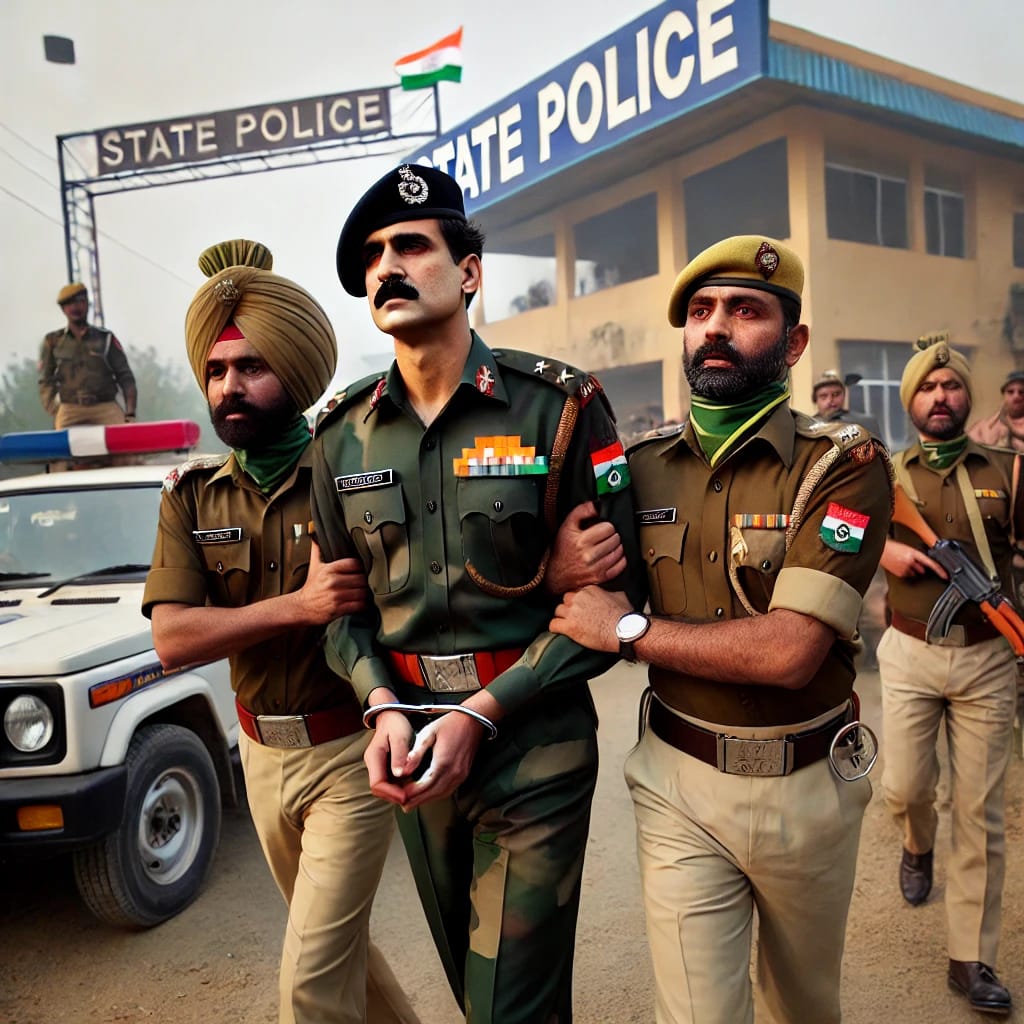The recent arrest of Capt Singh from the 22 Sikh Regiment by the Odisha Police has sparked significant debate regarding the legal parameters for arresting any serving Army personnel, particularly when they are on leave. While many believe that military officers are immune from civilian legal processes, the law offers a more nuanced perspective, especially in cases where cognizable offenses are involved.
The Legal Framework
According to the law, if an Army officer is involved in a cognizable offense, meaning a crime for which the police have the authority to arrest without a warrant (such as murder or rape), the state police are fully empowered to arrest the officer, regardless of whether the officer is on leave or active duty. However, Section 45 of the Code of Criminal Procedure (CrPC), 1973 offers certain protections to Army personnel, specifically regarding actions taken in the line of duty. Under this section, officers cannot be arrested without the sanction of the Central Government if the alleged offense was committed while performing their official duties.
The core question here, then, is whether the offense in question is related to the officer’s official military duties. If it is, the state police would need to obtain the central government’s permission before proceeding with an arrest. If the crime is unrelated to official duties, such as a civilian matter, the arrest can be carried out without such consent, albeit with some additional protocol, including informing military authorities.
The Role of Section 475 of CrPC and The Army Act, 1950
Section 475 of CrPC further clarifies the procedure when a member of the Armed Forces is arrested for a civilian offense. The section mandates that any arrested personnel who are subject to military law must be handed over to military authorities if the military courts have jurisdiction over the offense. This applies especially in cases where a court-martial might be the appropriate forum for the trial. The Army Act, 1950, extended to the Air Force and Navy, grants immunities to military personnel from civil arrest, stating that even when not on duty, military personnel retain some protections under military law.
In the recent case of Capt Singh, it is essential to examine whether the alleged crime occurred in a civilian area or was related to his military duties. If the crime took place in a civilian context, Odisha Police would technically have the jurisdiction to arrest him, especially if the offense was grave, such as murder or rape. However, the military’s involvement in the investigation remains crucial, as mandated by Section 475.
Also read: The Indian Army’s Resolute Stand for Women’s Honor
Protocol for Arresting an Army Officer
The CrPC, coupled with the Army Act, outlines a clear protocol for the arrest of serving Army personnel. Even when the state police have grounds for arresting an Army officer, certain conditions apply:
1. Informing Military Authorities: When an Army officer is arrested, the nearest military station headquarters must be notified. The police cannot hold the officer in custody for more than two hours without permission from the Station Commander, a Brigadier-level officer. If the military authorities do not grant permission to keep the officer in custody, the officer must be handed over to the Military Police.
2. Arrest Without Handcuffs: An arrested Army officer cannot be handcuffed unless absolutely necessary, according to the memorandum of arrest. This provision applies even if the officer is on leave and accused of a civilian offense.
3. Crimes that Allow Direct Arrest: If the officer is accused of a serious crime, such as rape, murder, or abduction, the police can proceed with an arrest without awaiting permission from military authorities. However, in other cases, the military’s role in the investigation becomes more significant, as the civil judiciary respects the outcome of military trials like court-martials.
Implications in the Case of Capt Singh
In the case of Capt Singh’s arrest, it is crucial to establish whether the alleged crime occurred in a civilian setting and if it was within the jurisdiction of the Odisha Police. If the crime was committed during his leave and within a civilian area, the police had the legal right to arrest him, provided they informed the relevant military authorities and adhered to the established protocol. However, if the crime was linked to his duties as a military officer, permission from the Central Government would have been necessary before his arrest.
Additionally, it is essential to consider whether the case will be handled by the civil judiciary or whether Capt Singh will be tried under a court-martial. As Section 197(2) of the CrPC stipulates, prosecution for actions taken in the course of official duty requires protection from prosecution, further complicating the legal process.
A Breach of Protocol?
The arrest of serving Army personnel like Capt Singh raises complex legal questions about the jurisdiction and powers of the civil police versus the military’s own judicial processes. While state police are empowered to arrest military personnel for crimes committed in civilian contexts, strict protocols must be followed, including the involvement of military authorities. Given the intricacies of military law, such cases often find themselves in a grey area, where the boundaries between civil and military justice must be navigated with precision.
As the legal proceedings in Capt Singh’s case unfold, they will likely set a precedent for how future cases of Army personnel being arrested by state police will be handled, particularly in the context of the immunities and protections granted by Indian law to its Armed Forces.
